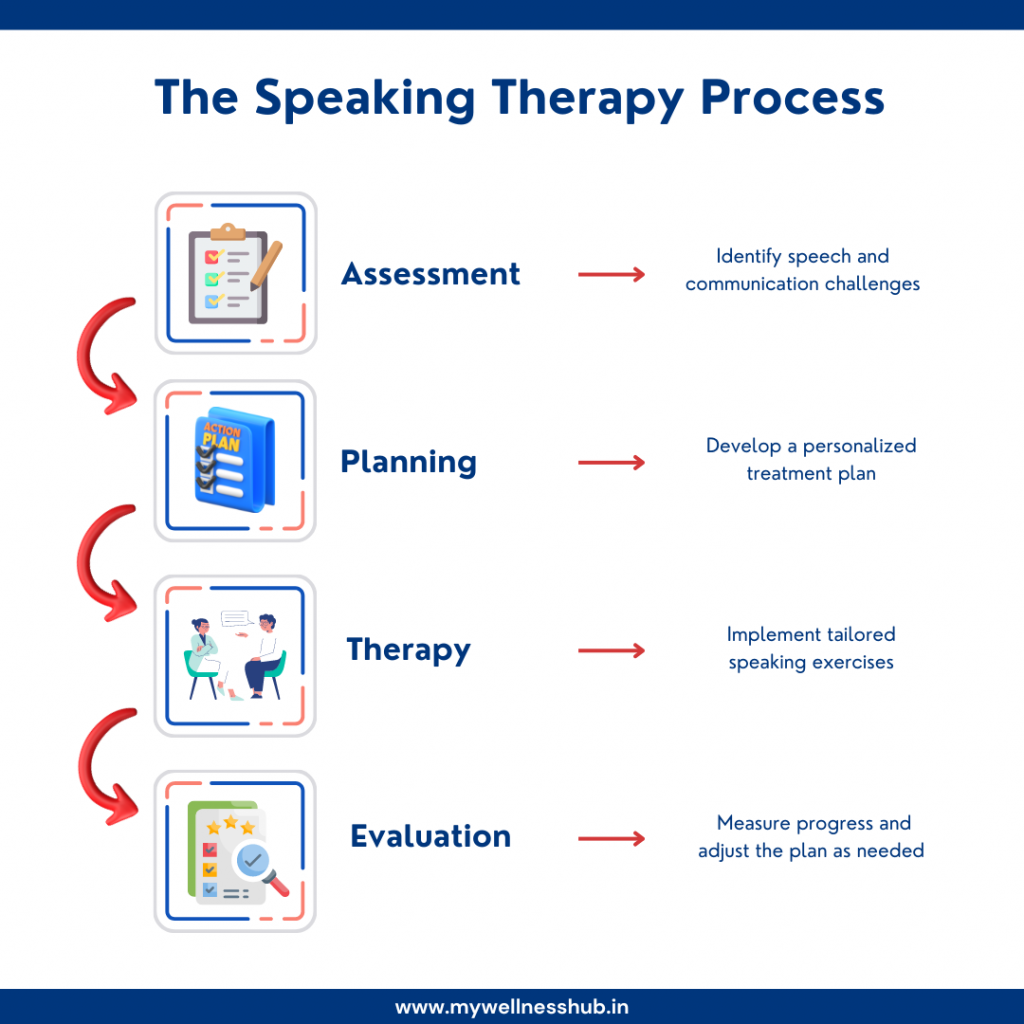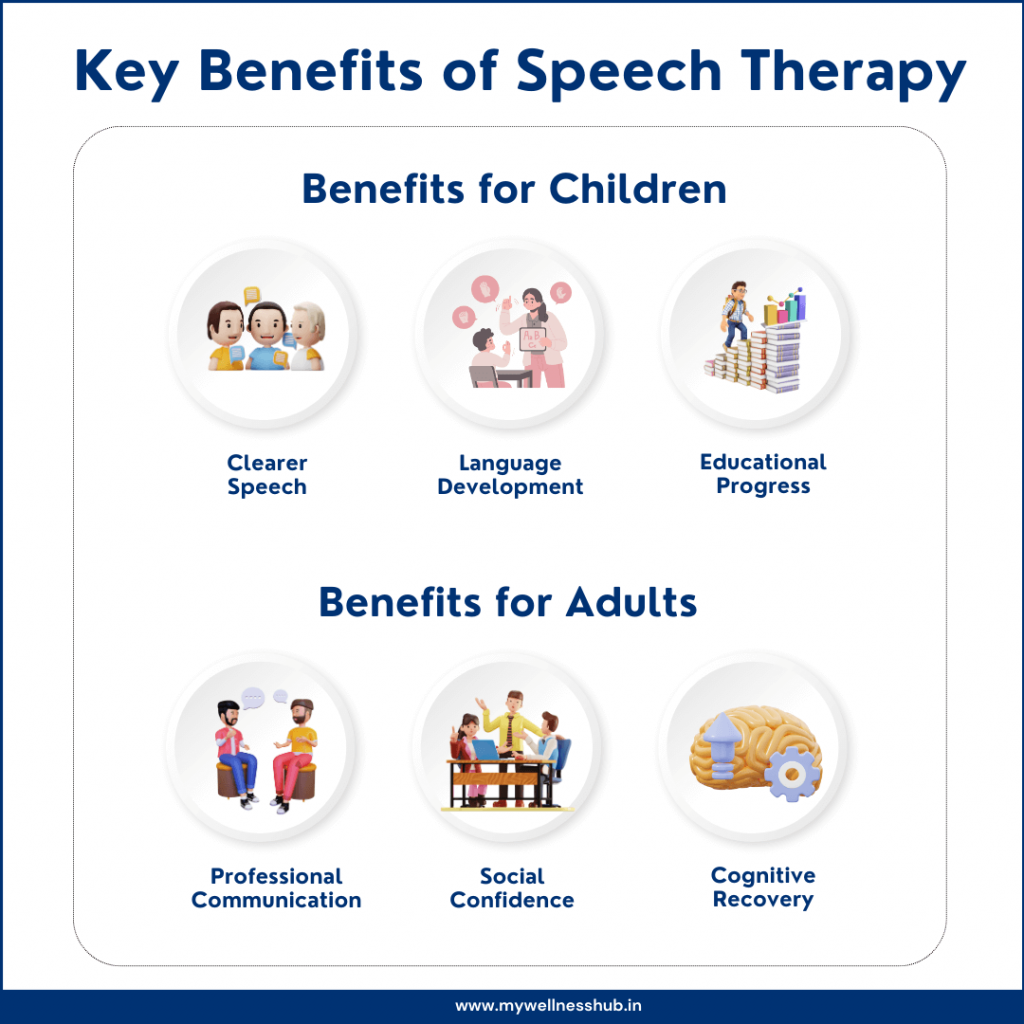The Essential Guide to Speaking Therapy: What You Need to Know
By Rajini D
Last Updated: July 1, 2024
Have you ever felt the frustration of struggling to find the right words during a conversation or noticed how communication barriers affect your daily interactions? Imagine being able to express yourself effortlessly, whether in a meeting, a casual chat, or with loved ones. Effective communication is essential for understanding and being understood. This is where speaking therapy becomes invaluable. Often seen as a tool for children or those recovering from medical conditions, speaking therapy can enhance communication skills for people of all ages. It’s not just about correcting speech; it’s about unlocking the potential to communicate clearly and confidently.
Understanding Speaking Therapy: A Simple Explanation
So, what exactly is speaking therapy? In the simplest terms, speaking therapy is a type of intervention designed to help individuals improve their verbal communication skills. It involves a range of techniques and exercises aimed at enhancing the clarity, fluency, and effectiveness of speech. Whether you’re working to overcome a stutter, improve articulation, or learn to modulate your tone, speaking therapy provides the tools and guidance needed to achieve clearer and more effective communication.
Also read :Top Speech Pathology Exercises for Better Communication
Speaking therapy isn’t just for those who have experienced a speech impediment or medical condition affecting their speech. It’s for anyone who wants to enhance their communication skills. From young children developing their language abilities to adults wanting to make a stronger impression in professional or social settings, speaking therapy is versatile and widely applicable.
To learn more about how speech therapy can assist with specific conditions like stuttering check out our detailed guides on What is Stuttering?

Who Benefits from Speaking Therapy?
- Children with Developmental Delays: Helps in overcoming challenges with language acquisition and speech clarity.
- Adults with Speech Impediments: Assists adults recovering from strokes or injuries that have impacted their speech.
- Professional Speakers: Aids professionals who rely on their voice for work, such as teachers, lawyers, and public speakers, in enhancing vocal delivery.
- Anyone Looking to Improve Communication: Offers techniques for better articulation and clearer speech to anyone interested in personal development.
What Issues Does Speaking Therapy Address?
Speaking therapy tackles a wide range of communication issues. Here are a few:
- Stuttering and Stammering: Provides strategies to control and reduce speech disruptions.
- Articulation Disorders: Focuses on improving how sounds are formed, making speech more understandable.
- Voice Disorders: Enhances the quality of voice including tone, pitch, and volume.
- Fluency Problems: Helps smooth the flow of speech.
- Language Delays: Supports both children and adults in developing age-appropriate language skills.
The Transformative Benefits of Speaking Therapy
Have you ever considered how much smoother your life might run if communicating were just a bit easier? Whether it’s chatting with friends, presenting in meetings, or simply ordering coffee, clear communication is key. That’s where speaking therapy comes into play—not just as a remedy but as a transformative tool for enhancing life’s quality across all ages.
Enhancing Quality of Life and Communication Skills
Speaking therapy goes beyond just fixing speech patterns; it empowers individuals with the confidence to express themselves clearly and effectively. The benefits of investing in your communication skills through speaking therapy are profound and far-reaching:
- Boosts Self-Esteem: As your speech improves, so does your confidence. Being able to express yourself clearly can significantly enhance your self-esteem and reduce feelings of frustration or anxiety associated with speaking.
- Improves Professional Opportunities: In any career, good communication is a major asset. Speaking therapy can refine your presentation and negotiation skills, making you more persuasive and articulate.
- Enhances Social Interactions: Clear communication is vital for building and maintaining relationships. Speaking therapy can help you engage more effectively in social settings, improving your ability to share ideas and feelings.
Benefits Across Various Age Groups and Conditions
- For Children: It helps in early development stages by improving their ability to form words and sentences, enhancing their ability to communicate needs and emotions effectively. This early intervention sets the foundation for successful educational and social experiences.
- For Adults: Whether recovering from a stroke or looking to sharpen professional communication skills, adults find speaking therapy crucial for regaining control over their speech and enhancing workplace interactions.
- For Seniors: As we age, maintaining clear communication is essential for independence and social interaction. Speaking therapy can assist seniors in managing or improving speech difficulties due to aging or neurological conditions like Parkinson’s disease.
- For Individuals with Specific Conditions: From stuttering to aphasia, speaking therapy provides targeted techniques that help manage specific speech and communication disorders, enabling a better quality of life.

Parents looking for more resources on supporting their children’s speech development might find our Tips for Parenting an Autistic Child helpful.
Key Techniques in Speaking Therapy: Tools for Better Communication
In speaking therapy, a variety of techniques are employed by therapists to address and improve different aspects of speech and communication. Understanding these techniques can help you see just how tailored and effective speaking therapy can be. Let’s dive into some of the most common methods used and how they apply in therapy sessions.
1. Articulation Therapy:
Articulation therapy is crucial for individuals who have difficulty pronouncing certain sounds or words clearly. This technique involves exercises that focus on the precise movement of the tongue, lips, and jaw to produce clear and accurate speech. In therapy sessions, speech therapists use various activities like word repetition and reading aloud to practice these sounds. This is especially helpful for children who are still developing their speech abilities and adults who want to refine their articulation for clearer communication.
2. Voice Modulation:
Voice modulation therapy is about more than just the volume of speech; it involves controlling the pitch, volume, and tone to make communication more effective. This technique is beneficial for professionals who use their voice extensively, like teachers and public speakers, ensuring their speech is engaging and easy to listen to. Therapists work on exercises that teach clients how to use their voice in different situations, enhancing both the expressiveness and the impact of their speech.
3. Fluency Shaping:
Fluency shaping is a technique used to smooth the flow of speech, particularly beneficial for those who stutter or have a cluttered speech. Techniques such as controlled breathing, pacing, and smooth onset of words help individuals speak more fluidly. During sessions, therapists might use modeling exercises where they speak a phrase slowly and clearly, and then the client repeats it, gradually increasing speed while maintaining fluency.
Comparison Table of Before and After Therapy
| Disorder Type | Symptoms Before Therapy | Improvements After Therapy |
|---|---|---|
| Stuttering | Frequent repetitions or prolongations of sounds or syllables, interruptions in the flow of speech, often accompanied by physical tension. | Reduced frequency of stuttering, smoother speech flow, increased speech confidence. |
| Aphasia | Difficulty in expressing oneself when speaking, trouble understanding speech, and difficulty with reading and writing, often due to a stroke or brain injury. | Improved ability to understand and use language, better verbal expression, and enhanced reading and writing skills. |
| Lisping | Incorrect articulation of sibilant sounds (like “s” and “z”), causing speech to sound unclear. | Clearer articulation of sibilant and other sounds, more intelligible speech. |
| Articulation Disorders | Difficulty in pronouncing certain consonants or vowels, distortions or substitutions in speech that make understanding difficult. | More accurate pronunciation of affected sounds, clearer speech, and better communication with others. |
| Voice Disorders | Hoarseness, breathiness, or a strained voice; may be due to nodules, polyps, or other vocal cord issues. | Improved voice quality, less vocal strain, and healthier vocal habits. |
For more on how tailored speech therapy exercises can help, read about 12 Stuttering Exercises at Home.
Who Can Benefit from Speaking Therapy?
Speaking therapy is a versatile tool that aids a diverse range of individuals, from young children grappling with the basics of speech to adults and seniors recovering from medical conditions that affect their ability to communicate. Let’s explore who can benefit from speaking therapy and look at some specific scenarios to understand its impact better.
1. Children with Speech Delays and Disorders
For many parents, discovering that their child has a speech delay can be distressing. Speaking therapy can be a beacon of hope, offering techniques to help children develop the skills they need to communicate effectively. For instance, consider the case of 5-year-old Aanya, who struggled with articulating sounds clearly. Through tailored articulation therapy, Aanya gradually improved, her newfound ability to express herself boosting her confidence and social interactions at school.
2. Adults Recovering from Strokes
Adults who have suffered a stroke often face daunting challenges with speech and language, a condition known as aphasia. Speaking therapy plays a critical role in their recovery by helping them regain their ability to communicate. Take the example of Mr. Singh, a 60-year-old stroke survivor. Initially unable to form complete sentences, Mr. Singh’s commitment to intensive speaking therapy allowed him to slowly rebuild his language skills, greatly enhancing his quality of life and interaction with his family.
3. Professionals Seeking Enhanced Communication Skills
Speaking therapy isn’t just for overcoming speech impediments; it’s also for anyone looking to refine their communication skills. Professionals, such as teachers, lawyers, and public speakers, often use speaking therapy to improve their vocal projection, clarity, and persuasion skills. For example, Sarah, a young lawyer, used voice modulation techniques learned in speaking therapy to improve her courtroom presence, making her arguments more compelling.
4. Seniors with Age-Related Speech Issues
As we age, it’s common for our speech to be affected by various health issues. Speaking therapy helps seniors maintain or regain their communicative abilities, which is essential for independence and social interaction. Consider 75-year-old Harish, who developed a speech disorder due to Parkinson’s disease. Regular speaking therapy sessions helped him maintain his ability to communicate, preserving his social connections and sense of independence.
5. Individuals with Pronunciation or Accent Modification Needs
People who wish to modify their accents for personal or professional reasons also find speaking therapy beneficial. It can provide them with the tools to adjust their pronunciation to be better understood in their environments, thereby increasing their confidence in social and professional settings.
The Crucial Role of Speech Therapists in Speaking Therapy
Understanding the pivotal role of speech therapists is essential in appreciating how speaking therapy can significantly improve communication abilities. Speech therapists, or speech-language pathologists (SLPs), are highly trained professionals whose expertise and skills are fundamental in diagnosing, planning, and conducting effective speaking therapy.
Qualifications and Skills of Speech Therapists
Speech therapists typically hold a master’s degree or higher in speech-language pathology. To practice, they must be licensed by the relevant regulatory body, which involves passing rigorous national examinations and completing supervised clinical experience. This extensive training equips them with a deep understanding of various speech disorders, language development, and therapeutic techniques.
The skill set of a speech therapist is comprehensive:
- Analytical Skills: They assess speech, language, and swallowing difficulties accurately.
- Problem-Solving Skills: SLPs develop innovative treatment plans tailored to each individual’s needs.
- Interpersonal Skills: Effective communication with patients and their families is crucial, as is the ability to empathize and build trust.
- Detail-Oriented: They monitor progress meticulously and adjust therapies as needed to ensure optimal outcomes.
Their Role in Assessment, Planning, and Executing Therapy
- Assessment: The first critical role of a speech therapist is to conduct a detailed assessment of the individual’s speech and communication skills. This includes identifying issues with fluency, articulation, voice disorders, and other communication impairments. They use various tools and tests to measure aspects of speech and language, including comprehension, vocabulary, pronunciation, and the physical ability to produce speech.
- Planning: Based on the assessment findings, speech therapists design a comprehensive therapy plan. This plan sets specific, measurable goals tailored to address the individual’s unique challenges. It outlines the strategies and techniques that will be used, such as articulation therapy, voice modulation exercises, or fluency shaping strategies, depending on the individual’s needs.
- Executing Therapy: Speech therapists are hands-on in delivering therapy. They work one-on-one with clients, employing various therapeutic exercises and activities to improve their communication skills. They provide continuous support and motivation, adapting the therapy in response to the individual’s progress and feedback.
Learn more about Online Speech Therapy for Stuttering
How Wellness Hub Provides Access to Qualified Professionals
At Wellness Hub, we understand the importance of quality speaking therapy, and we take pride in connecting our clients with highly qualified and dedicated professionals. Our therapists are not only certified and experienced but also receive ongoing training to stay abreast of the latest advancements in speech therapy. This ensures that our clients receive the most effective and modern therapeutic techniques available.
Moreover, Wellness Hub offers a range of specialists who focus on different areas of speech therapy, allowing us to match clients with a therapist who best suits their specific needs. Our flexible scheduling and convenient locations mean that accessing top-tier speaking therapy services has never been easier.
Conclusion
Imagine effortlessly expressing your thoughts without the frustration of finding the right words or overcoming communication barriers. Whether in meetings, casual chats, or relationships, effective communication is crucial for connection and understanding. Speaking therapy is a vital tool that can dramatically enhance how we connect with those around us. It’s often associated with children or medical recovery, but it’s a powerful resource for people of all ages. Beyond correcting speech patterns, it unlocks the potential to communicate more effectively, clearly, and confidently, enriching our interactions and strengthening our bonds. Discover the transformative power of speaking therapy today!
Frequently Asked Questions:
1. What is speaking therapy?
Speaking therapy, also known as speech therapy, is a type of intervention service that aims to improve an individual’s speech and ability to understand and express language, including nonverbal language. It involves various techniques and exercises guided by qualified speech therapists to address speech-related challenges.
2. Who needs speaking therapy?
Individuals of all ages can benefit from speaking therapy. It’s particularly helpful for children with speech delays, adults recovering from strokes or other medical conditions that affect speech, professionals seeking to enhance communication skills, and seniors experiencing age-related speech issues.
3. How does speaking therapy work?
Speaking therapy begins with a thorough assessment by a certified speech therapist to identify specific speech issues. Based on this assessment, a personalized treatment plan is developed. This plan includes targeted exercises and regular sessions that focus on areas such as articulation, fluency, voice modulation, and language development.
4. How long does it typically take to see results from speaking therapy?
The duration needed to see results from speaking therapy can vary widely depending on the individual’s specific needs, the severity of the speech issues, and how frequently they attend therapy sessions. Some individuals may notice improvements in a few weeks, while others might need a longer period.
5. Can speaking therapy help with accent reduction?
Yes, speaking therapy can be very effective in accent reduction. Speech therapists can work with individuals to practice pronunciation and articulation exercises, helping them to modify their accent and speak more clearly in another language or dialect.
6. Is speaking therapy covered by insurance?
Coverage for speaking therapy depends on the individual’s insurance plan and the reasons for therapy. Many insurance plans cover speech therapy when medically necessary, such as after a stroke or for developmental delays in children. It’s important to check with your insurance provider for specific coverage details.
7. How do I choose the right speech therapist?
Choosing the right speech therapist involves considering their qualifications, experience, and specialization in specific speech issues. It’s also important to choose someone you feel comfortable with. Many clinics, including Wellness Hub, provide detailed information about their therapists’ qualifications and areas of expertise to help you make an informed decision.
8. What are the most common speech disorders treated by speaking therapy?
Speaking therapy treats a variety of speech disorders including stuttering, dysarthria, aphasia, and articulation disorders. Each of these conditions affects different aspects of speech, from fluency and voice quality to the ability to form words and sentences correctly.
9. Can speaking therapy benefit children with autism?
Yes, speaking therapy is often a key component of support for children with autism. It can help improve their verbal and non-verbal communication skills, enhance social use of language, and address specific challenges like echolalia (repeating words or phrases) and difficulties in expressive language.
10. What can I do to support progress in speaking therapy at home?
Supporting speaking therapy at home can significantly enhance the therapy’s effectiveness. This can include practicing exercises and techniques provided by the therapist, engaging in regular, focused conversations, reading together, and providing a supportive and patient communication environment. Consistency and encouragement are key to helping individuals apply new skills and increase their confidence.
About the Author:
Rajini Darugupally
M.Sc., Speech-Language Pathologist (9+ years of experience)
Rajini is a passionate and dedicated Speech-Language Pathologist with over 9+ years of experience, specializing in both developmental speech and language disorders in children and rehabilitation in adults. Driven by a desire to empower each individual to find their voice, Rajini brings a wealth of experience and a warm, genuine approach to therapy. Currently, at Wellness Hub, she thrives in a team environment that values innovation, compassion, and achieving results for their clients.
Book your Free Consultation Today
Parent/Caregiver Info:
Client’s Details:
* Error Message









